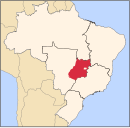Itaguaru | |
|---|---|
 Location in Goiás state | |
| Coordinates: 15°45′39″S 49°37′55″W / 15.76083°S 49.63194°W | |
| Country | Brazil |
| Region | Central-West |
| State | Goiás |
| Microregion | Anápolis Microregion |
| Area | |
• Total | 239.9 km2 (92.6 sq mi) |
| Elevation | 770 m (2,530 ft) |
| Population (2020 [1]) | |
• Total | 5,206 |
| • Density | 22/km2 (56/sq mi) |
| Time zone | UTC−3 (BRT) |
| Postal code | 76660-000 |
Itaguaru is a municipality in central Goiás state, Brazil.
Location
The distance to the regional center of (Anápolis) is 127 km. Highway connections are made by GO-070 / Goianira / Inhumas / Itauçu / GO-154 / Taquaral de Goiás / Itaguari. For a complete list of distances in the state of Goiás see Seplan
Neighboring municipalities are Jaraguá, Itaguari, Itaberaí and Uruana
Demographics
- Demographic Density: 22.79 inhabitants/km2 (2007)
- Number of voters: 4,924 (December/2007)
- Population growth rate: 0.12% 1996/2007
- Total population (2007): 5,467
- Total population (1980): 7,130
- Urban population (2007): 4,288
- Rural population (2007): 1,179
The economy
The economy is based on services, small industries, cattle raising (32,000 head in 2004), and modest agriculture.
- Number of industrial establishments: 15
- Number of retail establishments: 50
- Banking establishments: Banco do Brasil S.A. (August/2007)
- Dairies: Divino Cézar Ribeiro e Cia Ltda. (22/05/2006)
- Number of automobiles: 582
Agricultural data 2006
- Farms: 489
- Total area: 12,133 ha.
- Area of permanent crops: 3,530 ha. (bananas with 1,100 ha. hearts of palm, and coffee)
- Area of perennial crops: 431 ha.
- Area of natural pasture: 7,323 ha.
- Area of woodland and forests: 652 ha.
- Persons dependent on farming: 1,200
- Farms with tractors: 25
- Number of tractors: 34
- Cattle herd: 32,000 head IBGE
Health and education
- Hospitals: 2 (2007)
- Hospital beds: 40
- Health clinics (Sistema Único de Saúde): 1
- Schools: 5 (2006)
- Classrooms: 34
- Teachers: 80
- Number of students: 1,540
- Infant mortality rate: 26.30
- Literacy rate: 86.0
Itaguaru had a ranking of 0.746 (2000) on the Municipal Human Development Index, giving it a state ranking of 90 (out of 242 municipalities) and a national ranking of 1,997 (out of 5,505 municipalities). For the complete list see frigoletto.com.br










